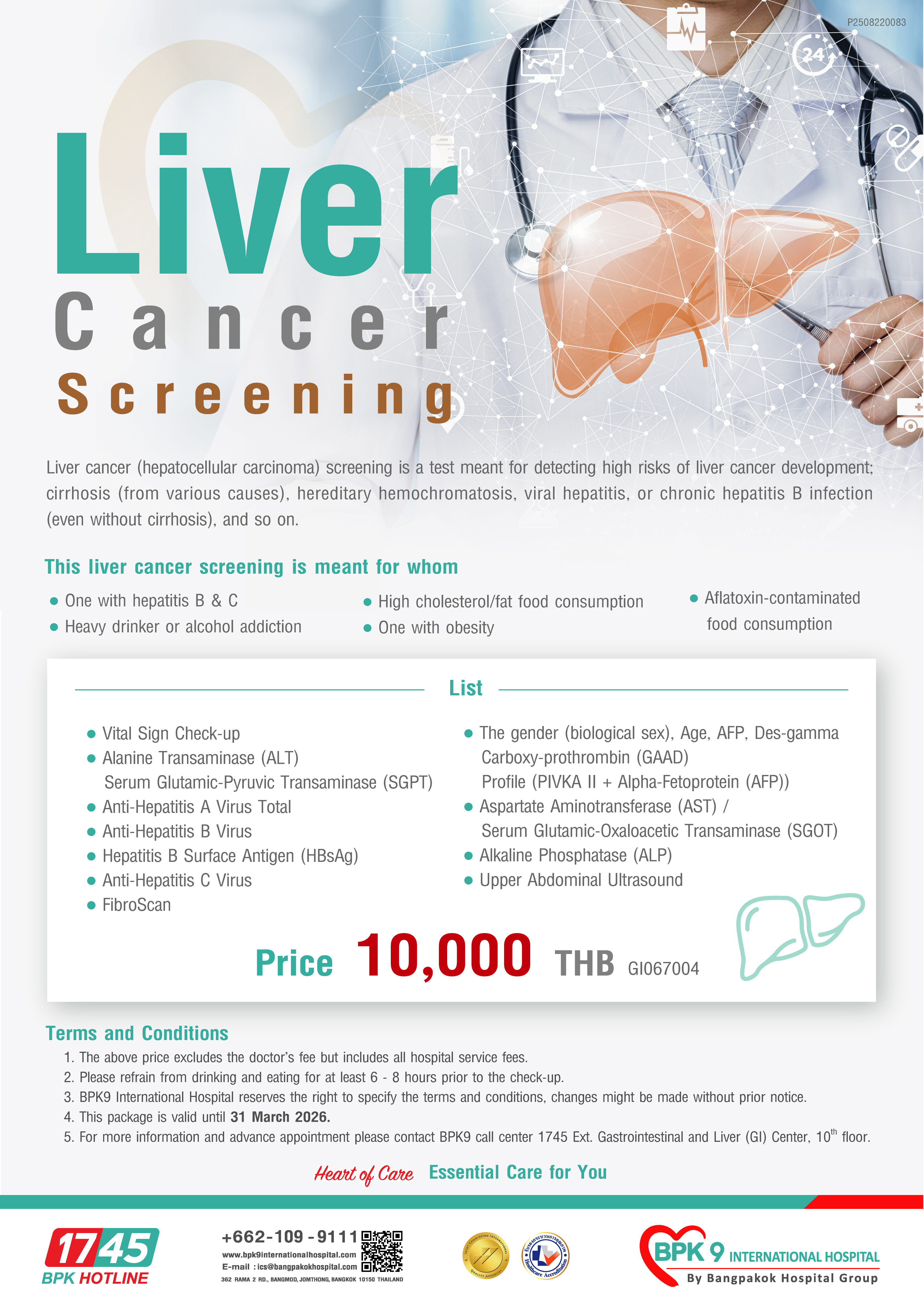Liver Cancer Screening

Liver cancer (hepatocellular carcinoma) screening is a test meant for detecting high risks of liver cancer development; cirrhosis (from various causes), hereditary hemochromatosis, viral hepatitis, or chronic hepatitis B infection (even without cirrhosis), and so on.
Primary liver cancer is a malignant tumor that begins in the liver. There are different types:
- hepatocellular carcinoma (HCC) or hepatoma, is the most common type of primary liver cancer and it starts in the main cell type in the liver, the hepatocytes
- cholangiocarcinoma, or bile duct cancer, starts in the cells lining the bile ducts (which connect the liver to the bowel and gall bladder)
- angiosarcoma, which starts in the blood vessels. This is a rare type of liver cancer that is more likely to occur in people over 70.
Secondary cancer in the liver is cancer that started in another part of the body but has spread to the liver. If you have secondary cancer in the liver, it may be useful to read information about the primary cancer in conjunction with this information or about cancer of unknown primary.
A secondary cancer is named after the primary site where it began, for example, bowel cancer with liver secondary. In this information, we use the term "secondary cancer in the liver" to refer to any cancer type that has spread to the liver.
Liver cancer signs and symptoms
Liver cancer symptoms are more likely to appear as the cancer grows or becomes advanced.
Symptoms may include:
- weakness and fatigue
- weight loss without exercising
- pain in the abdomen (upper part)
- swelling of the abdomen due to a build-up of fluid (ascites)
- nausea and vomiting
- pain in the right shoulder
- appetite loss and feeling sick
- yellowing of the skin and eyes (jaundice)
- pale bowel motions or white, chalky stools
Causes of liver cancer
Hepatitis B or C viruses which result in long-term (chronic) infection can cause liver cancer. This is the biggest known risk factor for primary liver cancer in Thailand.
There are other factors that can increase the risk of developing liver cancer, such as:
- fatty liver disease or genetic disorders including hemochromatosis, or alpha 1-antitrypsin deficiency
- certain inherited liver diseases
- type 2 diabetes
- chronic infection with HBV or HCV.
- excessive alcohol consumption
- obesity
- smoking tobacco
- exposure to certain chemicals; aflatoxins
What is Liver Cancer Screening?
Liver cancer screening is a proactive medical approach used to detect liver cancer at an early stage, often before symptoms appear. It involves routine tests and imaging studies performed on individuals who are at high risk for developing liver cancer, particularly hepatocellular carcinoma (HCC), the most common type. The goal of screening is to identify cancer early when treatment is most effective and potentially curative.
Who Needs Liver Cancer Screening?
Liver cancer screening is not for everyone but is highly recommended for individuals with increased risk factors, including:
- Chronic hepatitis B or C infections
- Cirrhosis (scarring of the liver) from any cause, such as alcohol-related liver disease or non-alcoholic fatty liver disease (NAFLD)
- A family history of liver cancer
- Individuals with aflatoxin exposure (a toxin found in contaminated food)
- Patients with metabolic disorders, such as hemochromatosis
Benefits of Liver Cancer Screening
- Early Detection and Treatment: Screening helps detect liver cancer before symptoms develop, allowing for earlier and potentially curative treatments such as surgery, liver transplantation, or localized therapies.
- Increased Survival Rates: Studies show that early detection significantly improves the survival rate of liver cancer patients.
- Less Aggressive Treatments: When detected early, liver cancer may require less aggressive interventions, reducing complications and improving the quality of life.
- Prevention of Advanced Disease: Timely screening prevents liver cancer from progressing to an advanced, often untreatable stage.
- Better Management of Liver Disease: Regular screening helps doctors monitor liver health and take preventive measures to slow or stop disease progression.
Liver cancer screening is a crucial tool for individuals at high risk, offering them a chance for early detection and life-saving treatment. If you have risk factors for liver cancer. Early action can make all the difference in protecting your liver health and overall well-being.
Terms and Conditions
- The above price excludes the doctor’s fee but includes all hospital service fees.
- Please refrain from drinking and eating for at least 6-8 hours prior to the check-up.
- BPK9 International Hospital reserves the right to specify the terms and conditions, changes might be made without prior notice.
- For more information and advance appointment please contact BPK9 call center 1745 Ext. Gastrointestinal and Liver (GI) Center, 10th

